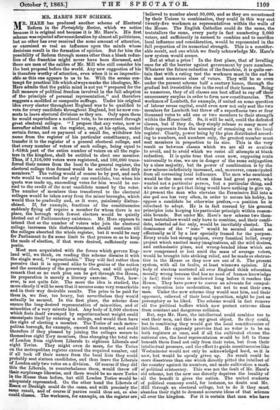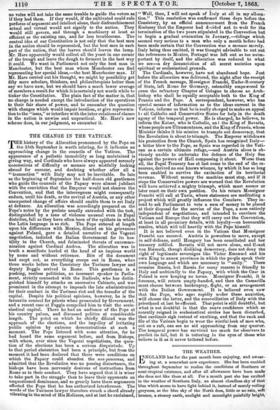MR. HARE'S NEW SCHEME.
11[R. HARE has produced another scheme of Electoral Reform in the Fortnightly Review, which we notice because it is original and because it is Mr. Hare's. His first scheme was rejected after consideration by almost all politicians, but no other has ever received the same amount of attention, or exercised so real an influence upon the minds whose decisions result in the formation of opinion. But for him the possibility of Reform through means other than a blank reduc- tion of the franchise might never have been discussed, and there are men of the calibre of Mr. Mill who still consider his the best proposal before the world. Any new suggestion of his is therefore worthy of attention, even when it is as impractic- able as this one appears to us to be. With the serene con- tempt for practical life which always marks the ideologue, Mr. Hare admits that the public mind is not yet " prepared for the full measure of political freedom involved in the full adoption of the principle of personal representation," and therefore suggests a modified or composite suffrage. Under his original idea every elector throughout England was to be qualified to vote for every candidate throughout England, but he now con- sents to leave electoral divisions as they are. Only upon them he would superinduce a national vote, to be exercised through great electoral colleges. " I propose that any voter, now or hereafter admitted on the register, may, at his option, under certain forms, and on payment of a small fee, withdraw his name from the register of his particular constituency, and transfer it to the register of a general electoral college, and that every number of voters of such college, being equal to 1-658th part of the entire number of voters on all the regis- ters in the kingdom, shall be entitled to elect one member. Thus, if 1,316,000 voters were registered, and 100,000 trans- ferred their names from the local to the general register, the electoral college thus formed would be entitled to elect fifty members." The voting would of course be by post, and each vote would be recorded for only one candidate, but when his quota was made up, succeeding votes for him would be car- ried to the credit of the next candidate named by the voter. The number of members thus transferred to the electoral colleges would be taken away from the minor boroughs, which would thus be gradually and, as it were, painlessly disfran- chised. If, for example, fractious of the constituencies suddenly flying off require a member for whom there is no place, the borough with fewest electors would be quietly blotted out of Parliamentary existence. Mr. Hare appears to intend that as the number of voters who join the electoral college increases this disfranchisement should continue till the colleges absorbed the whole register, but it would be easy for Parliament to fix some limit to that process so as to keep the mode of election, if that were desired, sufficiently com- posite.
Most men acquainted with the forces which govern Eng- land will, we think, on reading this scheme dismiss it with the single word, " impracticable." They will feel rather than perceive that it is opposed alike to the genius of the nation and the ascendancy of the governing class, and will quietly remark that as no such plan can be got through the House, its preparation is merely a literary exercise. That, how- ever, is not quite fair. The more the idea is studied, the more clearly it will be seen that it secures some very remarkable and in their way desirable results. The price to be paid for them is, we fear, too heavy, but nevertheless they would actually be secured. In the first place, the scheme does ensure the long-desired representation of minorities, and of minorities of a very minute kind. Any body of 2,000 electors which feels itself swamped by superincumbent weight could emancipate itself by entering a college, and would then have the right of electing a member. The Tories of each metro- politan borough, for example, exceed that number, and could therefore if they pleased by joining the colleges secure to themselves eight Tory members, thus changing the total vote of London from eighteen Liberals to eighteen Liberals and eight Tories. They might even do more, for the Tories on the metropolitan register exceed the required number, and if all took off their names from the local lists they could probably seat sixteen candidates, and thus leave the Liberals of London only two votes on a division. Of course if they did
this the Liberals, to counterbalance them, would throw off their surplusage likewise, and there would be no more Tories in the House than before, but still London Tories would be adequately represented. On the other hand the Liberals of Essex or Denbigh could do the same, and with precisely the same result, and of course if parties could thus act, so also could classes. The workmen, for example, on the register are believed to number about 50,000, and as they are accustomed by their Unions to combination, they could in this way seat twenty-five workmen as representatives within the walls of the House. The English Catholics could do the same, the teetotallers the same, every party in fact numbering 2,000 voters, and sufficiently in earnest to combine and to sacrifice local influence and consideration, would be represented in the full proportion of its numerical strength. This is a consider- able result, and one which we freely acknowledge Mr. Hare's new system would secure.
But at what a price ! In the first place, that of levelling once for all the barrier against government by pure numbers. Whatever the future reduction of the franchise, it is quite cer- tain that with a rating test the workmen must in the end be the most numerous class of voters. They will be so even under the present scheme half a century hence, through the gradual but irresistible rise in the rent of their houses. Being so numerous, they of all classes can best afford to ray off their unnecessary surplus in order to form new constituencies. The workmen of Lambeth, for example, if united on some question of labour versus capital, could even now not only seat the two members for Lambeth but throw off a superfluous two or four thousand votes to add one or two members to their strength within the House itself. So, it will be said, could the defeated classes, but if they do, they simply release so many more of their opponents from the necessity of remaining on the local register. Clearly, power being by the plan distributed accord- ing to numbers, and numbers only, the greatest number must seat members in proportion to its size. This is the very result as between classes which we are all so anxious to avoid, and to avoid which we resist all attempts at blank reduction. It is quite true that even now, supposing rents universally to rise, we are in danger of the same subjugation by a class majority, but its power of combination is by the new scheme indefinitely increased, and, moreover, emancipated from all correcting local influences. The men who combined would be the men over whom ideas had great power, who wanted not a particular person, but a particular thing, and who in order to get that thing would have nothing to give up. At present the man who elevates the Permissive Bill into a sine gild non has very often, in order to secure his hobby, to oppose a candidate he otherwise prefers,—a position he is reluctant to adopt. He is in fact coerced by his general principles into keeping his particular principle within reason- able bounds. But under Mr. Hare's new scheme two thou- sand teetotallers would only have to combine, and their candi- date, selected ad hoc only, would be inevitably elected. The dominance of the " isms " would be secured almost as effectually as if by a law specially framed for the purpose. Every crude but strong opinion, every fanatical belief, every project which excited many imaginations, all the wild desires, and enthusiastic plans, and wrong-headed ideas which are now compressed or lost amid the mass of average voters, would be brought into striking relief, and be made as obstruc- tive in the House as they now are out of it. The present system, with all its faults, at least winnows opinion. If a body of electors scattered all over England think education morally wrong because God has no need of human knowledge (a fact) their voice is mellowed long before it reaches the
House. They have power to coerce an advocate for compul- sory education into moderation, but not to seat their own man. Under the new scheme they would seat him, and their opponent, relieved of their local opposition, might be just as peremptory as he liked. The scheme would in fact remove all the political buffers which now protect extreme ideas from constant and dangerous collision.
But, says Mr. Hare, the intellectual could combine too to seat their men, and this is my great object. So they could, but in combining they would gut the local constituencies of
intellect. He expressly provides that no voter is to be on both registers at once, and if all the cultivated choose the national one, the local representation would be left to those
beneath them freed not only from their votes, but from their intellectual pressure, and the effort to guide constituencies like Westminster would not only be acknowledged hard, as it is
now, but would be openly given up. No result could be
more disastrous than one which directly pitted the intellect of the country against its numbers, and made cultivation a mark of political aristocracy. This was not the fault of Mr. Hare's old scheme, but the new one directly deprives the locality of all the benefit it gives the nation. The united students of political economy could, for instance, no doubt seat Mr. Mill through an electoral college, but to do it they must abandon their right to demand accurate ideas of that science all over the kingdom. For it is certain that men who have no votes will not take the same trouble to guide the voters as if they had them. If they would, if the cultivated could rule perforce of argument and intellect alone, their disfranchisement actual and virtual would not signify to the nation. They would still govern, and through a machinery at least as efficient as the existing one, and far less troublesome. The central idea of our Constitution is not only that the best men in the nation should be represented, but the best men in each part of the nation, that the leaven should leaven the lump. Mr. Hare apparently would collect all the yeast in one corner of the trough and leave the dough to ferment in the best way it could. We want in Parliament not only the best man in Manchester, but the best man whom Manchester can find representing her special ideas,—the best Manchester man. If Mr. Hare carried out his thought, we might by possibility get fifty mere scholars, thinkers, and philanthropists better than any we have now, but we should have a much lower average of members a result for which it is certainly not worth while to tinker the Constitution. The plain fact of the matter is, that no change is needed except the introduction of the operatives to their fair share of power, and to encumber the question with changes which would impair localism, or give representa- tion to the "isms," or interfere with the inter-relations of classes in the nation is unwise and unpractical. Mr. Hare's new scheme does, in our judgment, so encumber it.































 Previous page
Previous page